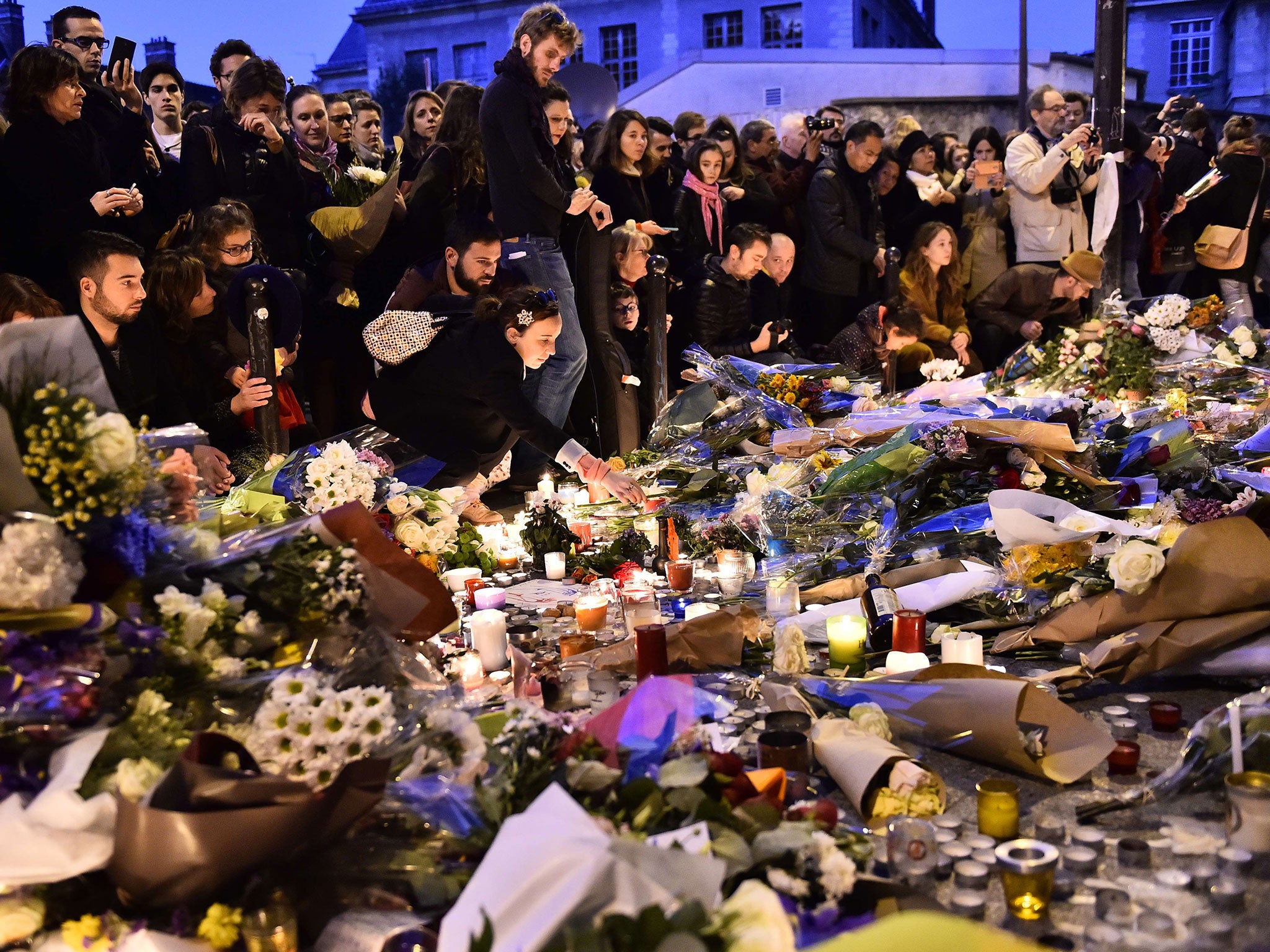When horrible attacks occur, the temptation to resort to language inflation is strong. In January, the Charlie Hebdo attack was described by some as “an act of war”. That was hyperbole: the massacre at the satirical magazine’s offices in Paris was a closely targeted assault on an ideological enemy of the Islamists.
Despicable and cowardly, it was cut from the same cloth as the murders of Hitoshi Igarashi, the Japanese translator of Salman Rushdie’s Satanic Verses, and the Dutch film-maker Theo van Gogh. Specific individuals were murdered for very specific reasons.
President François Hollande used the phrase “an act of war” on 13 November, but this time he was right. Random but closely co-ordinated, the attacks were precisely an act of war, the closest that terrorists can approximate to the carpet bombing of enemy cities carried out in the Second World War.
The difference this time is that there are no sirens, no air raid shelters, instead there is only the naked dread that comes from knowing that the attacks can come at any time, from any direction, and that – unlike, say, the IRA’s bombers – these killers want and expect to die in the process, to become “martyrs”. With the possible exception of chemical or biological attacks, it is hard to conceive of anything more frightening.
The fact that this is war, in which we are all equally at risk, changes the response. After January’s massacre, solidarity with the victims – “nous somme tous Charlie” – was optional. Today, standing together is a simple necessity. Let the lesson sink in: we are up to our necks in a brutal conflict with an enemy of great strategic strengths, with abundant funding, a large home territory, thousands of troops as happy to die as the soldiers of the Imperial Japanese Army, and – worst of all – with large numbers of sympathisers in our midst. That is the measure of what we are up against.
France has been disproportionately targeted, for reasons which are still being debated, but all countries which have been involved in fighting this enemy are at risk of similar attempts at retribution. A co-ordinated and determined international response is now imperative.
If Paris’s 129 dead spur the diplomats at Vienna’s conference on the Syrian civil war into bringing Isis’s enemies together in a co-ordinated response, their deaths will not have been vain.
Spillover from Syria
This war can trace its roots back to the Iraq invasion of 2003, which this newspaper campaigned against. Bringing down Saddam Hussein – an evil dictator – shattered the regional balance of power, to the advantage of Iran and its Shia allies, leading to the estrangement from the state of many in Iraq’s Sunni minority.
This unintended consequence was followed by the dismantling of Saddam’s army, which in turn led to the rise of Isis, whose unique strength among Islamist terror groups is its preponderance of senior officers with long experience of fighting for Saddam.
So yes, it’s our fault, in the same way that the Versailles conference was the fault of the First World War allies. But recognising the inequities of Versailles did not make the Nazis any less of a mortal threat; nor do the origins of Isis in the West’s political and military blunders diminish the urgent necessity of defeating it.
European dis-union
It is claimed that at least one of the terrorists who died on Friday night had arrived in France via Greece, as one of the half a million who have poured into Europe over the past year. The fear that terrorists could blend in with legitimate asylum-seekers may now be justified: cue Islamophobic rants from France’s Front National and its far-right allies elsewhere.
Never has it been more important that Europe get its act together on the migrant flows. It is vital that we offer help of every sort to those fleeing the Syrian civil war, but if that help is not to be torpedoed by populist governments building walls across the EU’s eastern flank, it is equally vital that Europe find the political will to defend its external borders from the easy and continuous predations of the people traffickers.
Sadly, this has been an urgent necessity for so long, and has elicited so feeble a collective response, that the odds of the EU now doing better are not good. But if it fails to take effective protective measures, Europe could begin to break up, while the soldiers of Isis will continue to make their way across the continent with little impediment.
What is required is a three-pronged policy: the replacement of the useless Frontex agency with a border protection force with real teeth; a rigorous weeding out, because Europe cannot absorb everybody, of economic migrants; along with a properly funded and co-ordinated plan to vet, receive and settle genuine refugees.
Will Black Friday be horrific enough to wake the EU from its torpor and put such policies into effect? We dearly hope so.
The new insecurity
War is different from peace. In the past, when wars were explicitly declared, that was readily understood. Today by contrast we slide helplessly into the quagmire and try to wish it away by pretending that everything is the same as before.
That course of inaction is no longer possible. The danger of a Mumbai-style marauding terror attack in Britain has been understood by the security services ever since those dark days in India in 2008. Now, after Paris, we know what such an attack looks like. That’s the sort of war we are in. We won’t get out of it without a concerted effort.


Join our commenting forum
Join thought-provoking conversations, follow other Independent readers and see their replies